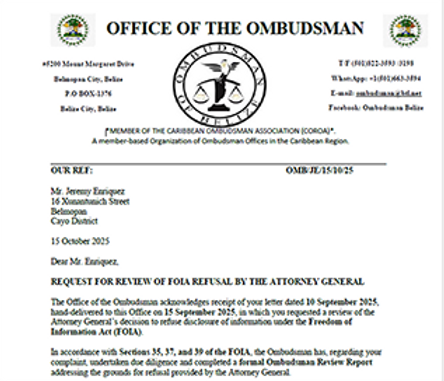A week after the Office of the Ombudsman instructed the Attorney General of Belize to adhere to the Freedom of Information Act (FOIA) and disclose details of government contracts with private attorneys, no official progress has been reported. Civic activist Jeremy Enriquez revealed on October 23 that the Ombudsman’s Office has yet to provide any updates since its directive on October 15. While it remains unclear whether the Attorney General’s Chambers has responded, the lack of communication suggests no developments have occurred. However, the two-week compliance period granted to the Attorney General has not yet lapsed.
The directive stemmed from a formal review by the Ombudsman under Sections 35, 37, and 39 of the FOIA, initiated after Enriquez contested the Attorney General’s refusal in September to release information on payments to private attorneys retained by the Belizean government. The Ombudsman ruled that the contracts, involving public funds, constitute public records and cannot be entirely withheld. The review clarified that ministries may redact only specific sections of documents exempt under Section 28(1) of the FOIA but cannot impose blanket secrecy on financial details of public interest. Consequently, the Ombudsman mandated the disclosure of the names of attorneys or law firms engaged by the government and the total amounts paid to each, while safeguarding legitimately confidential portions.
This case has emerged as a critical test of Belize’s transparency framework, scrutinizing the government’s chief legal adviser for compliance with a statute designed to uphold the rule of law. The Ombudsman’s decision emphasized that the FOIA is not a discretionary policy but a statutory obligation ensuring accountability for public expenditures.
With one week remaining before the compliance deadline, the focus now shifts to whether the Attorney General’s Chambers will act within the stipulated timeframe. Failure to comply could prompt Enriquez to seek judicial review before the Supreme Court under Section 39 of the FOIA, potentially transforming the dispute into a landmark case for institutional transparency. For now, Enriquez remains cautiously observant, noting that the process is still pending but time remains for the Attorney General to respond.
